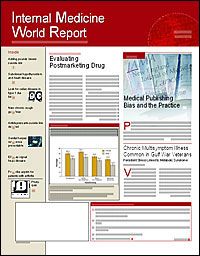Prescribe Prophylactic Aspirin Therapy for Patients with Arthritis
SAN DIEGO?Although patients with rheumatoid arthritis (RA) are at in?creased risk of myocardial infarction (MI) or coronary artery disease (CAD), it appears that many are deprived of the proven benefits of preventive therapy. A new study presented at the annual meeting of the American College of Rheumatology has shown that only 18.4% of patients with RA are receiving low-dose aspirin therapy compared with 25.1% of non-RA patients.
The investigators were unable to find any clinical, demographic, or treatment variables that would help explain this ?difference. During a 3-year period ending in 2004, 18,123 patients were surveyed semiannually as part of a study of ?rheumatic disease outcomes. Included were 14,114 patients with RA and 4009 patients with noninflammatory rheumatic disorders.
The US Preventive Services Task Force recommends routine low-dose aspirin therapy for all adults at increased risk for MI over the next 10 years.
"It may be that rheumatologists, in tune with the cardiovascular risk RA poses, are assum-ing that preventive issues are being addressed by the primary care physician, whereas primary care physicians may not be aware [that] those with RA are under additional cardiac risk that may warrant aspirin use," said lead investigator Lee Col?glazier, MD, a practicing rheumatologist in Crestview Hills, Ky. At the time this study was conducted, Dr Colglazier was a rheumatology fellow at Wake Forest University School of Medicine in Winston-Salem, NC.
Low-dose aspirin therapy was defined as 81 to 325 mg/day. Fewer patients with RA used low-dose aspirin therapy (18.4%) than patients without RA (25.1%), despite the former having a 1.7 times higher risk for MI. Of note, among patients with RA, more men used low-dose aspirin therapy than women.
These findings suggest that physicians may feel that the complicated RA ?treat?ments argue against additional therapies, even a potentially life-saving one such as prophylactic aspirin. Another factor may be the package insert and pharmacist ?recom?mendations against combining aspirin with methotrexate (Trexall) or nonsteroidal antiinflam?matory drugs.
"Many physicians may not realize that RA needs to be treated as a risk factor similar to high blood pressure, high ?cholesterol, and family history of heart attacks. It is a risk factor for heart attacks. So, when patients have RA, you need to look at them like you do anybody else with diabetes or high blood ?pressure," Dr Colglazier told IMWR. "You need to put these patients on ?preventive medicine."
Many physicians mistakenly believe that aspirin therapy is contraindicated in patients taking medications prescribed for RA, which is often not the case. For example, the package insert for metho?trexate warns against concurrent use with aspirin, yet most leading experts feel concurrent use is safe.
Dr Colglazier noted that the leading cause of death among patients with RA is CAD. This study shows that a simple, inexpensive therapy, such as low-dose aspirin, that may be highly effective in lowering CAD mortality, is being overlooked.
